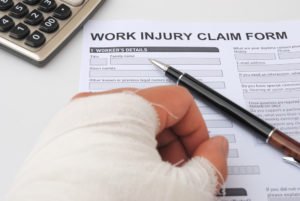There’s a good chance all you know about workers’ compensation, also known as “workers’ comp” is the big poster in your break room at work. It’s a critical benefit that your employer is supposed to provide to all employees in case of injury or illness while you’re on the job. But too many people don’t know what it is or what they’re entitled to. So what is workers’ compensation?
It’s a Type of Insurance and Employee Benefit
 Workers’ comp is an employee benefit that covers you in the event you’re injured, become ill, or even die while doing your job. You don’t have to be at your place of employment, but you do need to be working. Workers’ compensation covers you when you’re traveling, offsite, or physically at work. This is an insurance coverage your employer purchases on your behalf.
Workers’ comp is an employee benefit that covers you in the event you’re injured, become ill, or even die while doing your job. You don’t have to be at your place of employment, but you do need to be working. Workers’ compensation covers you when you’re traveling, offsite, or physically at work. This is an insurance coverage your employer purchases on your behalf.
It’s Required by Law
Although it’s considered an employee “benefit,” your employer is legally required to offer it with few exceptions. Every state has rules governing workers’ compensation, and they vary slightly. In Nevada, all employers with even one employee must carry workers’ compensation insurance in case of injury, illness, or death. Employees are covered, but not contract workers (workers who receive a 1099).Certain Expenses Will Be Paid
Workers’ compensation covers very specific expenses from your on-the-job accident or illness. It pays for your lost wages, usually half to two-thirds of what you typically get paid each week. Your medical costs relating to your specific injury will be paid for, as well as any rehabilitation costs. In the case of death, your family will receive death benefits.Multiple Types of Injuries are Covered
 Multiple forms of injury may be covered by workers’ comp.
Multiple forms of injury may be covered by workers’ comp.
- Physical injury from repetitive motion, exposure to toxins, hearing loss, or anything that occurs simply from doing your job.
- Aggravated pre-existing conditions like old back injuries that flare up because of an accident on the job or the work you’re doing.
- Trips, slips, falls, and other accidents that occur outside of the specific tasks of your job. Something could fall on you, a chair could break, you might slip on a wet floor, etc.
- Mental stress and strain due to work stress increased job duties, and even harassment from a supervisor may be covered. For mental strain to be covered, sometimes a physical injury must occur first.
Not Everything is Covered
There are a few circumstances where your injury or illness won’t be covered by workers’ compensation.- Purposely causing an accident with the intent to harm yourself
- Committing a crime that results in injury or illness
- Violating company policy and becoming ill or injured
- Having an accident while intoxicated
You May Be Eligible for Disability Payments
 In workers’ comp cases, there are two forms of disability payments -- temporary and permanent. Temporary disability pays two-thirds of your monthly wages from your employer. You continue to receive it until your injury gets better but won’t improve further with treatment. You can also receive temporary partial disability payments while you’re back at work, but receiving less pay.
Permanent disability benefits are paid in one of two ways. You’ll receive two-thirds of your monthly wages as long as you are considered totally disabled -- these are catastrophic disabilities like amputations or blindness. To qualify you must unable to get a job due to your disability.
If you’re considered partially permanently disabled, you’ll receive a percentage of benefits based on where your doctor rates your disability from 1 to 100 percent. Your payment each month will be 0.6 percent for each one percent of impairment. These payments end when you turn 70. You may receive these payments even if you’re able to return to work.
In workers’ comp cases, there are two forms of disability payments -- temporary and permanent. Temporary disability pays two-thirds of your monthly wages from your employer. You continue to receive it until your injury gets better but won’t improve further with treatment. You can also receive temporary partial disability payments while you’re back at work, but receiving less pay.
Permanent disability benefits are paid in one of two ways. You’ll receive two-thirds of your monthly wages as long as you are considered totally disabled -- these are catastrophic disabilities like amputations or blindness. To qualify you must unable to get a job due to your disability.
If you’re considered partially permanently disabled, you’ll receive a percentage of benefits based on where your doctor rates your disability from 1 to 100 percent. Your payment each month will be 0.6 percent for each one percent of impairment. These payments end when you turn 70. You may receive these payments even if you’re able to return to work.
You May Be Offered Light Duty or Work Accommodations
Assuming you’re not permanently and totally disabled, your employer and doctor will try to get you back to work as soon as possible. Depending on your injuries, you can be sent back on light duty which may mean doing some other job instead of your normal one. Or you may be given special accommodations. Examples include lumbar support for a desk chair or a stool if you work at a cash register all day.You Must Follow Reporting Deadlines
 To receive the maximum benefits you’re allowed, you must follow certain deadlines. You have seven days to report an injury, illness, or accident to your employer. You have 90 days to file a workers’ compensation claim for medical costs or lost wages because you missed work. As soon as something happens, talk to your employer so you can start the claims process.
To receive the maximum benefits you’re allowed, you must follow certain deadlines. You have seven days to report an injury, illness, or accident to your employer. You have 90 days to file a workers’ compensation claim for medical costs or lost wages because you missed work. As soon as something happens, talk to your employer so you can start the claims process.